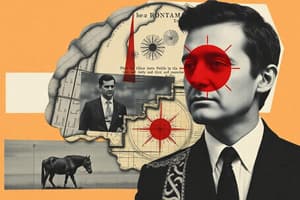Podcast
Questions and Answers
What is critical thinking?
What is critical thinking?
Critical thinking is the ability to analyze, evaluate, and synthesize information objectively to form a reasoned judgment. It requires skepticism, open-mindedness, and a focus on evidence.
Why is critical thinking necessary for advancing scientific knowledge?
Why is critical thinking necessary for advancing scientific knowledge?
Critical thinking ensures that personal biases, emotions, and preconceived ideas don't influence scientific conclusions. It encourages continuous questioning of theories, driving scientific progress.
Give an example of how critical thinking has led to scientific advancement.
Give an example of how critical thinking has led to scientific advancement.
The emergence of Einstein's theory of relativity led to the revisiting of Newton's classical mechanics, demonstrating critical thinking's role in questioning established theories and driving scientific progress.
What are two core characteristics of a critical thinker?
What are two core characteristics of a critical thinker?
Explain why it is important for a critical thinker to be skeptical.
Explain why it is important for a critical thinker to be skeptical.
Why is it important for a critical thinker to be humble?
Why is it important for a critical thinker to be humble?
How can critical thinking help us to be better consumers of scientific information?
How can critical thinking help us to be better consumers of scientific information?
In what way does critical thinking enhance the scientific method?
In what way does critical thinking enhance the scientific method?
Who proposed that all matter is composed of invisible particles?
Who proposed that all matter is composed of invisible particles?
What is the definition of "Teleological Explanation" as used in Aristotle's method?
What is the definition of "Teleological Explanation" as used in Aristotle's method?
What was the primary limitation of Aristotle's method?
What was the primary limitation of Aristotle's method?
Who is credited with introducing systematic experimentation to scientific investigation?
Who is credited with introducing systematic experimentation to scientific investigation?
What is the difference between Thales and Democritus' theories?
What is the difference between Thales and Democritus' theories?
What was the main contribution of al-Razi to the development of scientific methodology, and what is an example of this contribution?
What was the main contribution of al-Razi to the development of scientific methodology, and what is an example of this contribution?
In the context of scientific methodology, what does "empirical evidence" refer to?
In the context of scientific methodology, what does "empirical evidence" refer to?
What are the 4 steps involved in Aristotle's method?
What are the 4 steps involved in Aristotle's method?
What is the key principle behind Francis Bacon's approach to science?
What is the key principle behind Francis Bacon's approach to science?
What did Galileo Galilei contribute to the scientific revolution?
What did Galileo Galilei contribute to the scientific revolution?
What is the hypothetico-deductive method, and who is credited with developing it?
What is the hypothetico-deductive method, and who is credited with developing it?
What are the four types of idols identified by Francis Bacon?
What are the four types of idols identified by Francis Bacon?
What role did the ancient Greeks contribute to the development of scientific method?
What role did the ancient Greeks contribute to the development of scientific method?
How did the Medieval Islamic Golden Age advance scientific methodology?
How did the Medieval Islamic Golden Age advance scientific methodology?
What notable medical advancements occurred during the Medieval Islamic Golden Age?
What notable medical advancements occurred during the Medieval Islamic Golden Age?
What time period is associated with the Modern Scientific Revolution?
What time period is associated with the Modern Scientific Revolution?
What is the main problem with using an appeal to emotion in a scientific argument?
What is the main problem with using an appeal to emotion in a scientific argument?
Why is cherry-picking data a problem in science?
Why is cherry-picking data a problem in science?
Explain why the argument from ignorance is considered a fallacy in science.
Explain why the argument from ignorance is considered a fallacy in science.
Describe the role of replication in confirming scientific claims.
Describe the role of replication in confirming scientific claims.
What is the significance of large-scale studies in scientific research?
What is the significance of large-scale studies in scientific research?
How does skepticism contribute to critical thinking?
How does skepticism contribute to critical thinking?
What is the role of objectivity in scientific analysis?
What is the role of objectivity in scientific analysis?
Explain why falsifiability is a crucial characteristic of a scientific claim.
Explain why falsifiability is a crucial characteristic of a scientific claim.
What is the logical fallacy known as "correlation vs. causation" and provide an example from the text?
What is the logical fallacy known as "correlation vs. causation" and provide an example from the text?
What is confirmation bias and give an example from the text?
What is confirmation bias and give an example from the text?
Explain the logical fallacy "ad hominem" and provide an example from the text.
Explain the logical fallacy "ad hominem" and provide an example from the text.
What is a hasty generalization and give an example from the text?
What is a hasty generalization and give an example from the text?
In the context of scientific reasoning, explain the difference between correlation and causation.
In the context of scientific reasoning, explain the difference between correlation and causation.
What are two ways that critical thinking can help us to evaluate scientific information more effectively?
What are two ways that critical thinking can help us to evaluate scientific information more effectively?
Why is it important to consider multiple studies when forming an opinion about a scientific subject?
Why is it important to consider multiple studies when forming an opinion about a scientific subject?
Describe how confirmation bias can negatively impact scientific progress.
Describe how confirmation bias can negatively impact scientific progress.
What approach did Galileo Galilei use to enhance scientific precision?
What approach did Galileo Galilei use to enhance scientific precision?
What is the primary focus of the scientific method developed by Francis Bacon?
What is the primary focus of the scientific method developed by Francis Bacon?
What key contributions did Isaac Newton make to science?
What key contributions did Isaac Newton make to science?
Define a logical fallacy in the context of scientific reasoning.
Define a logical fallacy in the context of scientific reasoning.
Why are logical fallacies significant in scientific discussions?
Why are logical fallacies significant in scientific discussions?
What is an example of hasty generalization in scientific claims?
What is an example of hasty generalization in scientific claims?
Explain the strawman fallacy with reference to evolutionary theory.
Explain the strawman fallacy with reference to evolutionary theory.
What is an example of the appeal to authority fallacy in science?
What is an example of the appeal to authority fallacy in science?
Flashcards
Critical Thinking
Critical Thinking
The process of thoughtfully analyzing, evaluating, and synthesizing information to form a reasoned judgment. It involves skepticism, open-mindedness, and a focus on evidence.
Importance of Critical Thinking in Science
Importance of Critical Thinking in Science
Critical thinking plays a vital role in the advancement of scientific knowledge by ensuring the validity of scientific findings.
Curiosity
Curiosity
The ability to ask meaningful questions about a topic.
Skepticism
Skepticism
Signup and view all the flashcards
Humility
Humility
Signup and view all the flashcards
Natural Laws
Natural Laws
Signup and view all the flashcards
Naturalism
Naturalism
Signup and view all the flashcards
Aristotelian Method
Aristotelian Method
Signup and view all the flashcards
Observation (Aristotelian)
Observation (Aristotelian)
Signup and view all the flashcards
Classification (Aristotelian)
Classification (Aristotelian)
Signup and view all the flashcards
Deductive Reasoning (Aristotelian)
Deductive Reasoning (Aristotelian)
Signup and view all the flashcards
Teleological Explanation
Teleological Explanation
Signup and view all the flashcards
Teleology
Teleology
Signup and view all the flashcards
Inductive Reasoning
Inductive Reasoning
Signup and view all the flashcards
Systematic Observation
Systematic Observation
Signup and view all the flashcards
Idols (Bacon)
Idols (Bacon)
Signup and view all the flashcards
Galileo's Mathematical Approach
Galileo's Mathematical Approach
Signup and view all the flashcards
Hypothetico-Deductive Method
Hypothetico-Deductive Method
Signup and view all the flashcards
Newton's Laws of Motion and Gravitation
Newton's Laws of Motion and Gravitation
Signup and view all the flashcards
The Modern Scientific Revolution
The Modern Scientific Revolution
Signup and view all the flashcards
Ancient Greek Foundations of Scientific Method
Ancient Greek Foundations of Scientific Method
Signup and view all the flashcards
Correlation does not equal causation
Correlation does not equal causation
Signup and view all the flashcards
Ad hominem fallacy
Ad hominem fallacy
Signup and view all the flashcards
Hasty generalization
Hasty generalization
Signup and view all the flashcards
Confirmation bias
Confirmation bias
Signup and view all the flashcards
Single study fallacy
Single study fallacy
Signup and view all the flashcards
Galileo's Approach to Science
Galileo's Approach to Science
Signup and view all the flashcards
Scientific Method
Scientific Method
Signup and view all the flashcards
Logical Fallacies
Logical Fallacies
Signup and view all the flashcards
Strawman Fallacy
Strawman Fallacy
Signup and view all the flashcards
Appeal to Authority
Appeal to Authority
Signup and view all the flashcards
Appeal to Emotion
Appeal to Emotion
Signup and view all the flashcards
Universal Laws of Motion
Universal Laws of Motion
Signup and view all the flashcards
Cherry-Picking
Cherry-Picking
Signup and view all the flashcards
Argument from Ignorance
Argument from Ignorance
Signup and view all the flashcards
Objectivity
Objectivity
Signup and view all the flashcards
Empirical Evidence
Empirical Evidence
Signup and view all the flashcards
Falsifiability
Falsifiability
Signup and view all the flashcards
Study Notes
The Science of Critical Thinking
- Critical thinking is the process of analyzing, evaluating, and reasoning logically to make informed decisions.
- It includes questioning assumptions, examining evidence, identifying biases, and using structured reasoning.
Learning Objectives
- Students will trace the historical development of the scientific method.
- Students will distinguish between science and pseudoscience using specific criteria.
- Students will identify and analyze common logical fallacies in scientific contexts.
- Students will apply critical thinking tools to evaluate scientific claims.
Table of Contents
- The Evolution of Scientific Thinking: Critical Thinking & Scientific Method
- Understanding Pseudoscience: Distinguishing Science from Non-Science
- Logical Fallacies in Scientific Context: Understanding and Identifying Flaws
- Conclusion and Key Takeaways
The Evolution of Scientific Thinking
- The scientific method evolved over centuries through intellectual development, debate, and refinement.
- Early Greek thinkers (Thales, Aristotle, Democritus) laid the groundwork for scientific thinking by emphasizing observation and reasoning.
- The Aristotelian method of investigation, observation, classification, and teleological explanations were foundational, though without experimental verification.
- Islamic scholars during the Middle Ages, like Alhazen (Ibn al-Haytham) and Al-Razi, made crucial contributions to scientific methodology by emphasizing empirical evidence, systematic experimentation, and mathematical modeling.
- The modern scientific revolution (16th-17th centuries) saw significant shifts in scientific thinking with figures like Francis Bacon, Galileo, and Isaac Newton.
- Francis Bacon's empiricism emphasized inductive reasoning, systematic observation, and the elimination of biases.
- Galileo's mathematical approach combined mathematics with experimental observation, idealized experiments, and quantitative measurements.
- Newton's synthesis combined mathematical analysis with experimental verification, leading to universal laws of motion and gravity.
Logical Fallacies in Scientific Contexts
- Logical fallacies are errors in reasoning that undermine the validity of scientific arguments.
- Common fallacies in science include:
- Straw man fallacy: Misrepresenting an argument to make it easier to attack.
- Appeal to authority: Accepting something as true simply because an authority figure says so.
- Mistaking correlation for causation: Assuming that because two things occur together, one causes the other.
- Confirmation bias: Favoring evidence that supports pre-existing beliefs while ignoring contradictory evidence.
- Ad hominem: Attacking the person making a claim rather than the claim itself.
- Hasty generalization: Drawing a conclusion based on limited or insufficient evidence.
- Appeal to emotion: Manipulating emotions rather than presenting rational evidence.
- Cherry-picking: Selecting only evidence that supports a claim while ignoring contradictory data.
- Argument from ignorance: Claiming something is true because it hasn't been proven false (or vice versa).
Conclusion and Key Takeaways
- Critical thinking is crucial for evaluating scientific claims.
- Understanding the evolution of scientific thinking, including its historical context, is important to appreciate the foundations of today's scientific methodology.
- Logic plays a vital role in scientific reasoning. Avoiding logical fallacies is essential for conducting rigorous and unbiased scientific work.
- Emphasize the importance of skepticism, objectivity, empirical evidence, falsifiability, and logical reasoning.
Science vs. Pseudoscience
- Science is characterized by: falsifiability, empirical testing, peer review, and self-correction
- Pseudoscience usually lacks these characteristics. It often shows resistance to testing, a lack of self-correction, and appeals to authority instead of evidence.
Additional Resources
- The provided slides list relevant books as additional resources for further study.
Remember
- Critical thinking in science is about understanding how to ask the right questions and evaluate evidence. It goes beyond simply knowing facts.
Studying That Suits You
Use AI to generate personalized quizzes and flashcards to suit your learning preferences.



